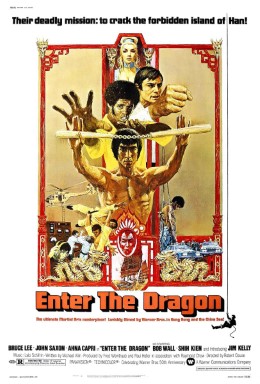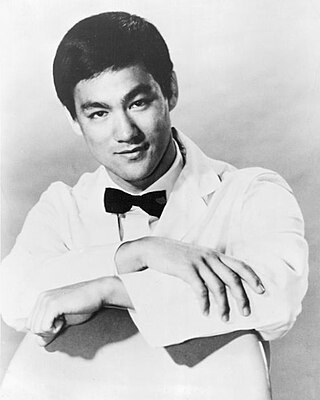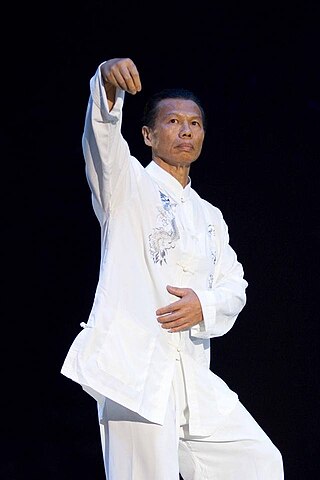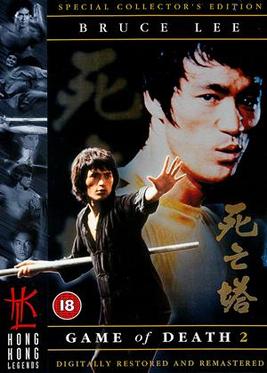See also
- Le Jeu de la Mort (English: The Game of Death), a 2009 French documentary
Game of Death is an incomplete Hong Kong film directed, written, produced and starring Bruce Lee, who died during its production.
Game of Death can also refer to:

Enter the Dragon is a 1973 martial arts film directed by Robert Clouse and written by Michael Allin. The film stars Bruce Lee, John Saxon, Ahna Capri, Bob Wall, Shih Kien, and Jim Kelly. Enter the Dragon was Bruce Lee's final completed film appearance before his death on 20 July 1973 at the age of 32. An American-Hong Kong co-production, the film was premiered in Los Angeles on 19 August 1973, one month after Lee's death.

Bruce Lee was a Hong Kong-American martial artist and actor. He was the founder of Jeet Kune Do, a hybrid martial arts philosophy drawing from different combat disciplines. Credited with helping popularize martial arts films in the 1970s, Lee is considered by some commentators and martial artists to be the most influential martial artist of all time and a pop culture icon of the 20th century, who bridged the gap between East and West. He is credited with promoting Hong Kong action cinema and helping to change the way Chinese people were presented in American films.

Brandon Bruce Lee was an American actor. Establishing himself as a rising action star in the early 1990s, he landed what was to be his breakthrough role as Eric Draven in the supernatural superhero film The Crow (1994). However, Lee's career and life were cut short by his accidental death during the film's production.
Dragon: The Bruce Lee Story is a 1993 American biographical drama film directed by Rob Cohen. The film stars Jason Scott Lee, with a supporting cast including Lauren Holly, Nancy Kwan and Robert Wagner. The film follows the life of actor and martial artist Bruce Lee (Jason) from his relocation to the United States from Hong Kong to his career as a martial arts teacher, and then as a television and film actor. It also focuses on the relationship between Bruce and his wife Linda Lee Cadwell, and the racism to which Bruce was subjected.
The Game of Death is an incomplete Hong Kong martial arts film, of which portions were filmed between September and October 1972, directed, written, produced by and starring Bruce Lee. The project was paused to film and produce Enter the Dragon. For The Game of Death, over 120 minutes of footage was shot, which was later misplaced in the Golden Harvest archives. The remaining footage has since been released with Lee's original Cantonese and English dialogue, with John Little dubbing Lee's Hai Tien character as part of the documentary titled Bruce Lee: A Warrior's Journey. Much of the footage that was shot is from what was to be the climax of the film.
Chopsocky is a colloquial term for martial arts films and kung fu films made primarily by Hong Kong action cinema between the late 1960s and early 1980s. The term was coined by the American motion picture trade magazine Variety following the explosion of films in the genre released in 1973 in the U.S. after the success of Five Fingers of Death. The word is a play on chop suey, combining "chop" and "sock".
Corey Yuen Kwai was a Hong Kong film director, film producer, action choreographer, and actor. Yuen attended the China Drama Academy and was one of the Seven Little Fortunes. In Hong Kong, he worked on several films such as Bruce Lee's Fist of Fury (1972), Hwang Jang-lee's Snuff Bottle Connection, Secret Rivals 2, The Invincible Armour, Dance of the Drunk Mantis (1979), Ninja in the Dragon's Den (1982), Millionaire's Express (1986), and Jet Li's Fong Sai-yuk II (1993), The New Legend of Shaolin (1994), High Risk, and My Father Is a Hero.

Yeung Sze, better known as Bolo Yeung, is a Hong Kong former competitive bodybuilder, martial artist, and martial arts film actor. Primarily cast as the villain in the movies he stars in, Sze is globally known for his performances as Bolo in Enter the Dragon (1973), starring Bruce Lee, and as Chong Li in Bloodsport (1988), starring Jean-Claude Van Damme, as well as other numerous appearances and a long career in Hong Kong martial arts films. Also stars in Double Impact
Bruce Li is a Taiwanese martial artist and actor who starred in martial arts films from the Bruceploitation movement.

James Milton Kelly was an American athlete, martial artist, and actor. After winning several karate championships, Kelly rose to fame in the early 1970s appearing in various action films within the martial arts and blaxploitation genres. Kelly played opposite Bruce Lee in 1973's Enter the Dragon, and had lead roles in 1974's Black Belt Jones as the title character and Three the Hard Way as Mister Keyes.
Bruceploitation is an exploitation film subgenre that emerged after the death of martial arts film star Bruce Lee in 1973, during which time filmmakers from Hong Kong, Taiwan and South Korea cast Bruce Lee look-alike actors ("Lee-alikes") to star in imitation martial arts films, in order to exploit Lee's sudden international popularity. Bruce Lee look-alike characters also commonly appear in other media, including anime, comic books, manga, and video games.

Shannon Emery Lee Keasler is an American actress, businesswoman, singer, and martial artist. She is the only living child of actor and martial artist Bruce Lee and retired martial arts teacher Linda Lee Cadwell, and is the younger sister of actor Brandon Lee. Through Bruce Lee she is a granddaughter of Cantonese opera singer and film actor Lee Hoi-chuen.

Game of Death II, also known as Tower of Death or The New Game of Death, is a 1981 Hong Kong martial arts film directed by Ng See-yuen and starring Bruce Lee, Tong Lung, Huong Cheng Li and Roy Horan. This film was marketed as a sequel to Bruce Lee's last and only partially completed film Game of Death. Bruce Lee died some years before the production of Game of Death II and most of his scenes are taken from Lee's older films, mostly Enter the Dragon. Aside from the international English dub giving the "Bruce Lee" character the name Billy Lo, this movie appears to have no connection with Robert Clouse's 1978 version of Game of Death.
Kim Tai-chung, also known as Kim Tai-jong or Tong Lung, was a South Korean martial artist, actor and businessman. A Taekwondo practitioner, he is best known for his martial arts films.
Robert Clouse was an American film director and producer, known primarily for his work in the action/adventure and martial arts genres. He died on February 4, 1997, in Oregon of kidney failure.
Big Boss or The Big Boss may refer to:
The touch of death is any martial arts technique reputed to kill using seemingly less than lethal force targeted at specific areas of the body.
Martial artist and actor Bruce Lee has been subject to extensive media coverage.
![<i>Bruce Lee: The Curse of the Dragon</i> 1993 [[Cinema of the United States|United States]] film](https://upload.wikimedia.org/wikipedia/en/8/80/BruceLeeCurseoftheDragon.jpg)
Bruce Lee: The Curse of the Dragon is a 1993 American documentary film about Bruce Lee. The film includes interviews from some of his fellow students and opponents who worked alongside him in his movies. The film is directed by Tom Kuhn and Fred Weintraub and written by Davis Miller, author of the books The Tao of Muhammad Ali, The Tao of Bruce Lee and "Approaching Ali."
The Dragon Lives, also known as He's a Legend, He's a Hero, is a 1976 Hong Kong martial arts film starring Bruce Li and directed by Wang Hsing-lei. A fictional account of Bruce Lee's life, it is one of numerous films which exploited the popularity of Lee after his death, a practice called Bruceploitation. The film was released in the United States by Film Ventures International on 19 September 1978.